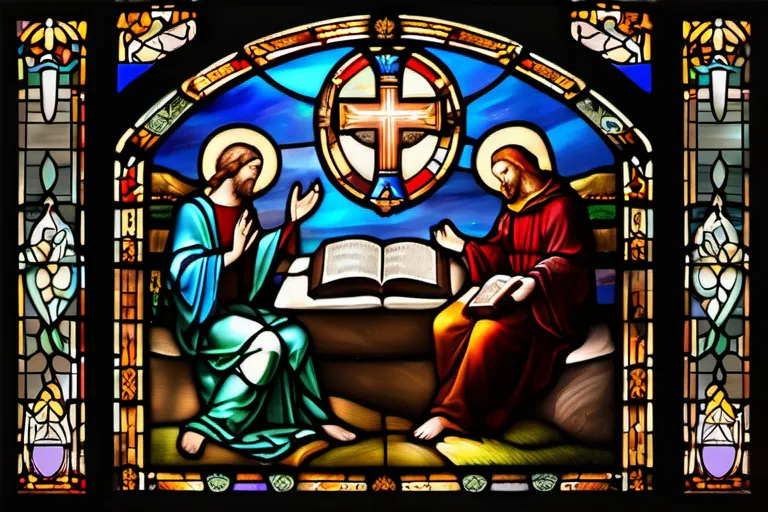Explore the distinctive aspects of Christian doctrine, from the Trinity to salvation.
Christianity is a monotheistic religion with over 2.4 billion followers worldwide. Its unique doctrines have shaped societies and influenced cultures for centuries. In this article, we delve into what makes Christian doctrine distinct from other religions.
The Nature of God: The Holy Trinity
What makes Christian doctrine unique? One pivotal aspect lies in the concept of the Holy Trinity, which sets Christianity apart from other religions. How can three persons—Father, Son, and Holy Spirit—be one God? This idea might seem as confusing as a puzzle with missing pieces, but it’s central to understanding who God is.
Imagine an intricate tapestry where each thread represents a person of the Trinity: the Father, Jesus Christ, and the Holy Spirit. Each thread has its own unique color and texture, yet when woven together, they form one seamless design. This intertwining nature symbolizes their unity in being one God.
The Father is often seen as the originator of all things, creating a universe with love and purpose. Jesus Christ, the Son, is the mediator between humanity and God, a bridge connecting us to eternal life. The Holy Spirit, the third person, represents the presence of God in our lives, guiding and empowering believers.
How can we reconcile these three distinct roles into one divine being? It’s like asking how a single flame can be both a light source and a warmth provider. In Christian doctrine, the Holy Trinity is a profound mystery that transcends human understanding yet deeply resonates with our spiritual quest for meaning.
The belief in the Trinity challenges us to explore faith beyond logic and into the realm of divine revelation. It invites us to accept this mystery as a testament to God’s complexity and love. By embracing the Holy Trinity, Christians find not only an explanation for the nature of God but also a guide for living a life deeply rooted in both spiritual depth and practical love.
Salvation: The Role of Jesus Christ
What makes Christian doctrine unique isn’t just about believing in one God who exists as three persons, but also understanding how this belief impacts our salvation through Jesus Christ. How does it feel to wonder if your sins can truly be forgiven? Do you often ponder the profound question: without Jesus’ sacrifice and resurrection, could anyone find true redemption?
Christianity teaches that salvation is found only in Jesus Christ. It’s a belief rooted deeply in the idea of his sacrificial death on the cross and his subsequent resurrection. How can such an event be anything but transformative? The Bible recounts how Jesus, as the Son of God, voluntarily faced crucifixion, bearing the weight of our sins to provide us with eternal life. His resurrection serves as a powerful symbol that not only validates his claims but also promises hope for believers.
Imagine standing at the edge of a deep, dark abyss—the place where sin and death reign supreme. The Bible paints a vivid picture: Jesus, our savior, reaches out with a hand of salvation, offering to pull us up into the light. His sacrifice is more than just a historical event; it’s a divine act that bridges the gap between humanity and God.
But how does this work in practice? When Christians confess their sins and trust in Jesus as Lord and Savior, they are not merely performing a ritual. They are embracing a profound transformation: from being lost to finding direction, from bondage to freedom, from death to eternal life. This is the essence of salvation through Christ—a journey that begins with faith and ends in victory.
Salvation isn’t just about going to heaven; it’s about living a life filled with purpose, love, and peace right here on earth. It’s like having a beacon guiding you through the darkest night, promising safety and comfort. This belief makes Christianity unique because it offers more than just an afterlife—it promises a changed life now.
So, as we explore this concept further, remember: Jesus Christ isn’t just the solution to our spiritual problems; he is the answer to every question of your heart. His sacrifice and resurrection are the foundation upon which all Christian beliefs stand, making his role in salvation central and irreplaceable.
The Bible: Authority and Interpretation
The Bible: Authority and Interpretation
Imagine standing at the foot of a towering mountain, its peaks lost in clouds. The top represents the pinnacle of Christian doctrine, and this mountain is built on the bedrock of the Bible. But what exactly gives the Bible such authority? And how do we navigate its vast, intricate valleys and steep cliffs?
Christianity places the Bible at the center of its faith, viewing it as a sacred text that guides believers through life’s tumultuous journey. This is not just any book; it’s considered the word of God, revealed to humanity for our enlightenment. But how did this ancient collection of texts become so revered? The answer lies in centuries of tradition and divine inspiration.
Think about it: why do people from different backgrounds and cultures all turn to the same words for guidance? It’s because these writings speak directly to human experience, addressing everything from love and justice to morality and salvation. The Bible isn’t just a historical document; it’s a living, breathing guide that continues to shape lives today.
Yet, interpreting the Bible can be as complex as deciphering an ancient script. There are numerous translations, each with its own nuances, making it challenging for individuals to find their personal path. How do we reconcile these differences? Is one interpretation more accurate than another?
The answer is multifaceted. While some Christians rely on literal interpretations, others see the text through a lens of metaphor and symbolism. Each approach offers valuable insights but requires discernment and critical thinking. It’s like navigating a labyrinth: you must hold onto the threads of your faith to find your way.
Moreover, the Bible isn’t just read; it’s lived out in communities. Through prayer, church traditions, and shared worship services, believers seek to embody its teachings. This communal aspect is crucial because it allows for mutual support and accountability, reinforcing the belief that faith isn’t a solitary endeavor but a collective journey.
In essence, the Bible’s authority stems from its perceived divine origin and the profound impact it has had on millions of lives. As we delve into its pages, we find ourselves continually questioning, pondering, and finding new meanings within its texts. It’s not just a book; it’s a lifeline that guides us through life’s challenges.
Human Nature and Sin
What exactly does Christian doctrine say about human nature and our inherent state? How do these views shape our understanding of sin and redemption?
In Christianity, human nature is often described as a complex mix of good and evil. The Bible suggests that while humans possess the capacity for both virtue and vice, we are fallen beings due to an original sin passed down from our first parents, Adam and Eve. This concept can be quite perplexing; how can something inherited make us inherently sinful?
A useful metaphor might help clarify this idea: imagine a garden that once bloomed with perfect flowers, but was tainted by a single poison ivy plant. Each of us carries the seeds of that initial sin within us, impacting our every thought and action.
The doctrine of original sin posits that because we inherit this sinful nature from our ancestors, we all are born into a state where we struggle with wrongdoing. This doesn’t mean that we are completely evil; rather, it suggests that without intervention, the natural inclination is towards sin.
So, how does one escape this cycle of sin and condemnation? The Christian doctrine offers a powerful answer: through redemption. Just as a savior must come to rescue those lost in the garden of Eden, Christians believe that Jesus Christ came to earth, lived a perfect life, died on the cross for our sins, and rose again. Through faith in His sacrifice, individuals can be reconciled with God.
But this process is not just about accepting an external truth; it involves a transformative change within each person. It’s like being given a new set of eyes that can see things differently – the world around us, our relationships, and even ourselves. This transformation is what makes the journey to redemption so deeply personal and rewarding.
The Church: Structure and Beliefs
When we delve into the structure of the Christian church, it’s like exploring a vast and intricate garden, where each element serves a specific purpose. The Church, in its historical context, has evolved much like a living organism, adapting to the needs and challenges of different eras while maintaining its core identity.
The central figure in this garden is often seen as the Pope, who acts as a shepherd guiding the flock. But what exactly is his role? Is he merely a figurehead or does he hold significant spiritual authority? The answer lies in understanding that the Pope’s role is multifaceted, encompassing both pastoral care and doctrinal leadership.
Another crucial aspect of Christian doctrine is the concept of sacraments. These are ritual actions with symbolic significance, such as baptism and communion. They serve as tangible expressions of faith, connecting believers to their spiritual roots in a profound way. How do these rituals impact one’s relationship with God? Are they just symbolic gestures or do they have real, transformative power?
The structure of the church also includes various levels of hierarchy, from local parishes to national and international organizations. Each level plays a role in supporting and guiding its members, much like branches of a tree support and nourish leaves. How does this hierarchical system affect the way teachings are disseminated and received by believers?
In exploring these questions, it’s important to consider the historical context. The early Church faced numerous challenges, from persecution to theological debates. These experiences shaped its structure and beliefs, making them resilient yet adaptable.
The sacraments and the role of the Pope are just two facets of a complex tapestry that makes up Christian doctrine. Each element interacts with others, creating a dynamic and ever-evolving system that seeks to address the spiritual needs of humanity in different times and places. How do you see these elements fitting into your own spiritual journey?
Christian Ethics and Morality
Christian ethics and morality are like a lighthouse, guiding believers through life’s stormy seas. But what makes these principles truly unique? Let’s dive into the heart of Christian ethics, exploring how the Ten Commandments function as moral beacons and why the Golden Rule is such a powerful guide in daily living.
The Ten Commandments are more than just rules; they’re like the Ten Commandments carved on tablets, serving as a clear set of guidelines for holy living. Each commandment addresses different aspects of human conduct: from honoring God and parents to avoiding stealing and lying. They provide a moral framework that goes beyond mere legalistic compliance, encouraging a heart transformation towards righteousness.
The Golden Rule, ‘Do unto others as you would have them do unto you,’ is like a golden thread woven throughout the fabric of Christian ethics. It’s not just about reciprocity; it’s about empathy and compassion. Imagine standing in someone else’s shoes—how would you want to be treated? This rule challenges us to act with integrity, kindness, and fairness, making our interactions with others more meaningful and respectful.
Both the Ten Commandments and the Golden Rule are deeply intertwined, reinforcing each other. While the commandments outline specific behaviors, the Golden Rule embodies a spirit of love and mutual respect that permeates all aspects of Christian living. Together, they create a comprehensive ethical system that is both profound and practical, guiding Christians in their daily decisions.
Conclusion
 By understanding the key aspects of Christian doctrine, you can gain a deeper appreciation for its rich history and impact on the world.
By understanding the key aspects of Christian doctrine, you can gain a deeper appreciation for its rich history and impact on the world.











